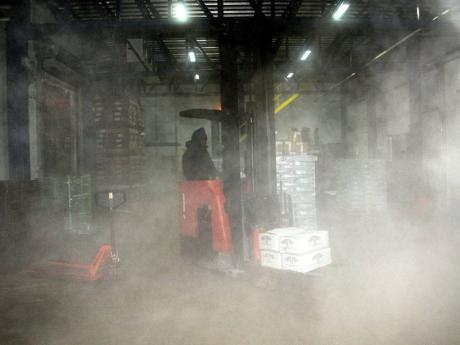Rainforest in expansion mode
Sacha Walters-Gregory, Staff Reporter
Rainforest Seafoods is now well on its way where manufacturing in Kingston is concerned.
The three-acre property along Slipe Road represents the company's more aggressive move into processing a variety of its products to include the Rainforest Ready line, a variety of easy-to-prepare burgers including: a snapper burger, seasoned beef, and a host of other flavours to come such as shrimp.
"One of the strategy objectives of the company is to become a net earner of foreign exchange and, to guide this thrust, we want to export as much indigenous seafood as we can," said Ernest Grant, general manager of the company. This seafood will include lobster and other products which are known to be of good quality from Jamaica.
They currently export a number of products to the Eastern Caribbean and hope to take that even further.
"We're looking also at many value-added products, not just for the Jamaican market, but for the export market, whether it's through Caricom or Europe or eventually into the United States and Canada," said Grant, adding that they will attempt to use as much indigenous material as possible in producing value-added products in these markets, a practice they currently employ in their production.
The Slipe Road facility, which has been in full operation for approximately three months, represents greater efficiency, storage capacity and ultimately, increased manufacturing capacity for the company.
"This improves our distribution ten-fold. What it means for us is that our customers will benefit so much more in terms of our efficiencies and integrity of our products," said Roger Lyn, marketing manager.
Between the Montego Bay operations and the new facility, they have a storage capacity of approximately 10 million pounds.
Rainforest has a facility which is tailored to produce its traditional packaged raw fish and shrimp, but also a variety of convenience foods such as a burger line, fish fingers, breaded fish fillets, and where possible, pickled products such as mackerel and pig's tail.
Smoked products
"Before now, we used to buy our marlin smoked. Now we're actually doing it ourselves," said Lyn, pointing out they also smoke a variety of other products including smoked turkey necks, turkey legs, salmon, and marlin.
The facility is state-of-the-art with ample capacity to meet their customers' needs. David Radlein, director of operations and new product development, said the move into further manufacturing is hinged on the need to create food security in Jamaica.
The facility is run through a delicate process of continual tempering of their products to ensure quality.
PLANT EFFICIENCY
The efficiency of the plant is regulated through a balance of machinery and manual labour, with the required certification from the relevant agencies. Their next goal is to achieve Hazard Analysis and Critical Control Points (HACCP) certification.
"You need about three months of production under your belt," said Radlein. "Rainforest is well on the way. The plant is also cleared to produce key products like lobster for export."
"Our processing plant has been approved by the Veterinary Services Division to be able to export products when we have the approval to export them," said Grant. They are currently awaiting full clearance to do so.
Grant noted that there are still opportunities for Jamaican fisherfolk to expand the fishing industry if they are able to fish for larger catch such as marlin and swordfish.
"These currently are being imported into Jamaica. If our fishermen can be empowered to go out, whether through the Government or private sector, to harvest these fish and bring them to our processing plant, we can process these for re-export into the region and North America, because there are big markets for these products," he said.





